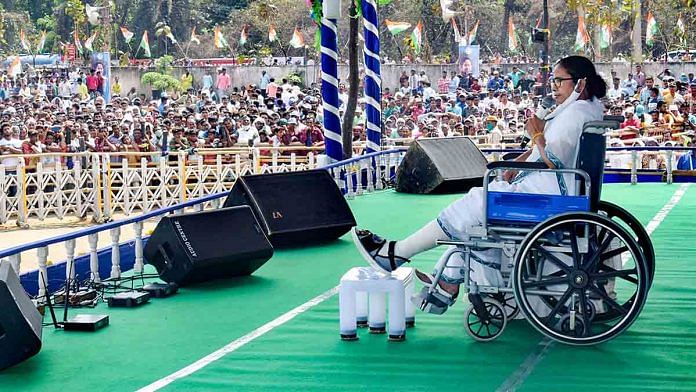With the sounding of the election bugle across five different states in India, social distancing has been substituted by social uprising, as reflected in the political campaigns.
The fear of the pandemic has fizzled away, as crowds unite to listen to their favourite leaders from their respective political parties. The entire mechanism of political campaigns, apart from being mired in money and muscle power, has often suffered from several paradoxes especially between the relationship of the electorate and the political leaders.
The first question that often gets raised is, “Why do people attend political rallies?”
The passionate supporters often call it the love for political parties or for a particular political leader or for a cogent political cause, which brings them to fight all odds and be part of the crowds.
After every such campaign, the organisers boast about their ‘record-breaking turnout’, and the opposition would know exactly how many turned up, as if to suggest they had fitted a drone to take snapshots for a headcount.
The voices from the pedestals are neither novel on content, cause or promises and echo much of what often gets discussed in newspapers and television channel debates. Yet, the outpouring of crowds remains a mystery, especially when there is no quid pro quo.
This probably happens due to the Bandwagon Effect, which leads to cognitive biases among the masses that arises out of the pressure and norms exerted by groups that influence individual decisions.
When such an effect is in operation, an individual often chooses the costlier option.
Should ruling dispensation campaign?
Secondly, is it justified to allow the ruling dispensation to actually campaign?
Had the incumbent already fulfilled all their electoral promises, it seems extremely irrational to splurge such large amounts of money as a last-ditch effort to influence the election results. Ideally, political campaigns by the Opposition, to narrate the alternative, makes much more sense in allowing the voters to decide.
Funnily enough, the stronger the party in power, the more vociferous is its campaign, before elections. This shows an acute lack of trust among political parties and voters, and how the former often forget the Benjamin Franklin effect.
The relationship between a political party and voter is that of the brand and customer. If the brand seeks favour and the customer obliges in the first attempt, consistent and loyal behaviour by the brand will more likely keep the customer captive in future.
To put it simply, if the voter shows loyalty at the first instance, it is more likely that the individual will not deviate, provided the electoral promises are not overturned.
Meanwhile, the opposition campaigns are always involved in nit-picking without introspecting on their own agendas. The manifestoes of the opposition are also a subset of the incumbent’s unfulfilled promises.
Moreover, in political campaigns, ideologies find greater space than ideas. The Opposition implicitly goes on to doubt and question the prudence of the voters who brought the ruling dispensation to power.
The alternative is not presented from the perspective of reform-based agenda but through a positioning of a neatly designed dilemma in the minds of the voter. In other words, the chosen proposition is to confuse the voter, when they cannot convince them.
‘Memoryless-ness’ of the public
Thirdly, why are the proposals during campaigns and post campaigns hardly cross-verified?
The freedom with which leaders announce lofty utopian promises shows the immense amount of trust in the voters’ fading memory. The campaign myopia is even more evident in the fact that political parties assume that their role in the past 59 months, of being in power or in opposition, would be forgotten and the last month before elections is what remains indelible. In statistical theory, ‘memoryless-ness’ is often associated with an ‘exponential distribution’, which also brings into light the importance of ‘waiting time’.
The ‘memoryless-ness’ and the ‘waiting time’ are traits observed in the voters while the leaders engage themselves in exponential promises. As a result, promises do not translate into actions after campaigns.
Finally, if election campaign rallies were the barometer of political support, every state in India would have multiple chief ministers and the country several more prime ministers.
Since political results are binary, the fuss around large gatherings is too ephemeral. Once again, the trust in the electorate gets backfired when numbers in political rallies do not convert into increasing seat share.
This is where political parties tend to confuse between ‘law of averages’ and ‘law of large numbers’.
While the ‘law of averages’ states that the distribution of outcomes in a sample reflects the distribution of outcomes of the population, the ‘law of large numbers’ is related to repeated occurrence of the same event and then finding inferences between the sample mean and population mean.
With these paradoxes in mind, the promises in political campaigns tend to be like academic theories, which are abstraction of the reality but not reality itself.
While the electorate continues to hope and the elected continue to cheat, the country engages itself in finding the balance between the prestige of the Left and the privilege of the Right.
Himadri Chakrabarty is a student of IIM Calcutta



